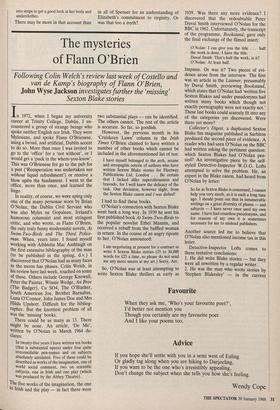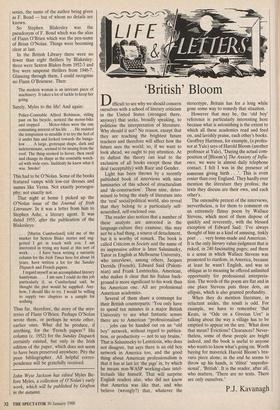The mysteries of Flann O'Brien
Following Colin Welch's review last week of Costello and van de Kamp's biography of Flann O'Brien, John Wyse Jackson investigates further the 'missing' Sexton Blake stories
In 1972, when I began my university career at Trinity College, Dublin, I en- countered a group of strange beings who spoke neither English nor Irish. They were Mylesians, and spoke Flann O'Brienese, using a broad, and artificial, Dublin accent to do so. More than once I was invited to go to the 'office' for a 'not without', or I would get a 'puck in the where-you-know'. This was O'Brienese for go to the pub for a pint ('Recuperation was undertaken not without liquid refreshment') or receive a blow upon the fundament. I went to the office, more than once, and learned the lingo.
In reality, of course, we were aping only one of the many personae worn by Brian O'Nolan, the Dublin Civil Servant who was also Myles na Gopaleen, Ireland's humorous columnist and most stringent critic, and who wrote, as Flann O'Brien, the only truly funny modernistic novels, At Swim-Two-Birds and The Third Police- man. When, years later, I found myself working with Aibhistin Mac Arnhlaigh on the first extensive bibliography of the man (to be published in the spring, d.v.) I discovered that O'Nolan had as many faces as the moon has phases. Colin Welch, in his review here last week, touched on some of these. Others include George ICnowall, Peter the Painter, Winnie Wedge, An Broc (The Badger), Cu SO4, The O'Blather, South American Joe, Brother Barnabas, Luna O'Connor, John James Doe and Mrs Hilda Upshott. Difficult for the bibliog- rapher. But the knottiest problem of all was the 'missing' books. There could be as many as 13. There aught be none. An article, 'De Me', written by O'Nolan in March 1964 de- clares:
In twenty-five years I have written ten books (that is substantial opera) under four quite irreconcilable pen-names and on subjects absolutely unrelated. Five of these could be described as works of the imagination, one of world social comment, two on scientific subjects, one in Irish and one play (which was produced by the Abbey Theatre).
The five works of the imagination, the one . in Irish and the play — in fact there were two substantial plays — can be identified. The others cannot. The rest of the article is accurate. So far, so goodish.
However, the previous month in his 'Cruiskeen Lawn' column in the Irish Times O'Brien claimed to have written a number of other books which cannot be included in the aforementioned list of ten: I have myself belonged to the arch, arcane and areopagitic coterie of authors who have written Sexton Blake stories for Fleetway Publications Ltd, London . . . Be certain that I lacked alike superciliousness and bravado, for I well knew the delicacy of the task. One deviation, however slight, from the Sexton Blake canon and I was dished!
I had to find these books.
O'Nolan's connection with Sexton Blake went back a long way. In 1939 he sent his first published book At Swim-Two-Birds to the popular novelist Ethel Mannin, and received a rebuff from the baffled woman in return. In the course of an angry riposte to her, O'Nolan announced: I am negotiating at present for a contract to write 6 Sexton Blake stories (25 to 30,000 words for £25 a time, so please do not send me any more sneers at my art.) Sorry, Art.
So, O'Nolan was at least attempting to write Sexton Blake thrillers as early as 1939. Was there any more evidence? I discovered that the redoubtable Peter Duval Smith interviewed O'Nolan for the BBC in 1962. Unfortunately, the transcript of the programme, Bookstand, gave only the final exchange of the filmed insert: O'Nolan: I can give you the title . . . half the work is done, I have the title.
Duval Smith: That's half the work, is it? O'Nolan: At least half.
Impasse. Or was it? Two pieces of evi- dence arose from the interview. The first was an article in the Listener, presumably by Duval Smith, previewing Bookstand, which states that O'Nolan had 'written five Sexton Blakes and under pseudonyms had written many books which though not exactly pornography were not exactly not.' These last books could scarcely fit into any of the categories yet discovered. Were there yet more?
Collector's Digest, a duplicated Sexton Blake fan magazine published in Surbiton produced the second piece of evidence. A reader who had seen O'Nolan on the BBC had written asking the pertinent question: which Sexton Blakes had O'Nolan pen- ned? An investigative piece by the self- styled Detective-Inspector W.O.G. Lofts attempted to solve the problem. He, an expert in the Blake canon, had heard from O'Nolan by letter:
So far as Sexton Blake is concerned, I cannot help you very much, as it is such a long time ago. I should point out that in innumerable writings on a great diversity of planes — and subjects — I have never once used my own name. I have had countless pseudonyms, and for reasons of my own it is sometimes necessary for me to mislead publishers.
Another source led me to believe that O'Nolan also mentioned income tax in this letter.
Detective-Inspector Lofts comes to these tentative conclusions: 1. He did write Blake stories — but they were all rewritten by a regular writer.
2. He was the man who wrote stories by 'Stephen Blakesley' — in the current series, the name of the author being given as F. Bond — but of whom no details are known.
So Stephen Blakesley was the pseudonym of F. Bond which was the alias of Flann O'Brien which was the pen-name of Brian O'Nolan. Things were becoming clear at last.
In the British Library there were no fewer than eight thrillers by Blakesley: three were Sexton Blakes from 1952-3 and five were suspense thrillers from 1946-7. Glancing through them, I could recognise no Flann O'Brienese. Then:
The modern woman is an intricate piece of machinery. It takes a lot of tackle to keep her going.
Surely, Myles to the life! And again:
Police-Constable Alfred Robinson, riding past on his bicycle, noticed the motor-bike and stopped . . . Motor-bikes were the one consuming interest of his life. . . He resisted the temptation to straddle it to try the feel of it under him and looked towards the bunga- low . . . A large, grotesque shape, dark and indeterminate, seemed to be issuing from the roof. The thing seemed to hover, then swell and change its shape as the constable watch- ed with wide eyes. Suddenly he knew what it was. Smoke!
This had to be O'Nolan. Some of the books featured vamps with low-cut dresses and names like Verna. Not exactly pornogra- phy; not exactly not.
That night at home I picked up the O'Nolan issue of the Journal of Irish Literature. In it was a letter from him to Stephen Ashe, a literary agent. It was dated 1955, after the publication of the Blakesleys: . . . [Martin Cumberland] told me of the market for Sexton Blake stories and sug- gested I get in touch with you. I am interested in trying my hand at this sort of work. . . . I have been writing a sarcastic column for the Irish Times here for about 16 years, have written a lot for the Sunday Dispatch and French papers.
I regard myself as an accomplished literary handyman.. . . I am sure I could do this job particularly if, as Cumberland said, he thought the plot would be supplied. Any- how, I should like to try. I would be willing to supply two chapters as a sample for nothing.
Thus far, therefore, the story of the mys- teries of Flann O'Brien. Perhaps O'Nolan wrote them, or perhaps he wrote other, earlier ones. What did he produce, if anything, for the 'French papers'? His column (c. 1952) for the Sunday Dispatch certainly existed, but only in the Irish edition of the paper, which does not seem to have been preserved anywhere. Pity the poor bibliographer. All helpful corres- pondence will be gratefully received.
John Wyse Jackson has edited Myles Be- fore Myles, a collection of O'Nolan's early work, which will be published by Grafton in the autumn.



















































 Previous page
Previous page